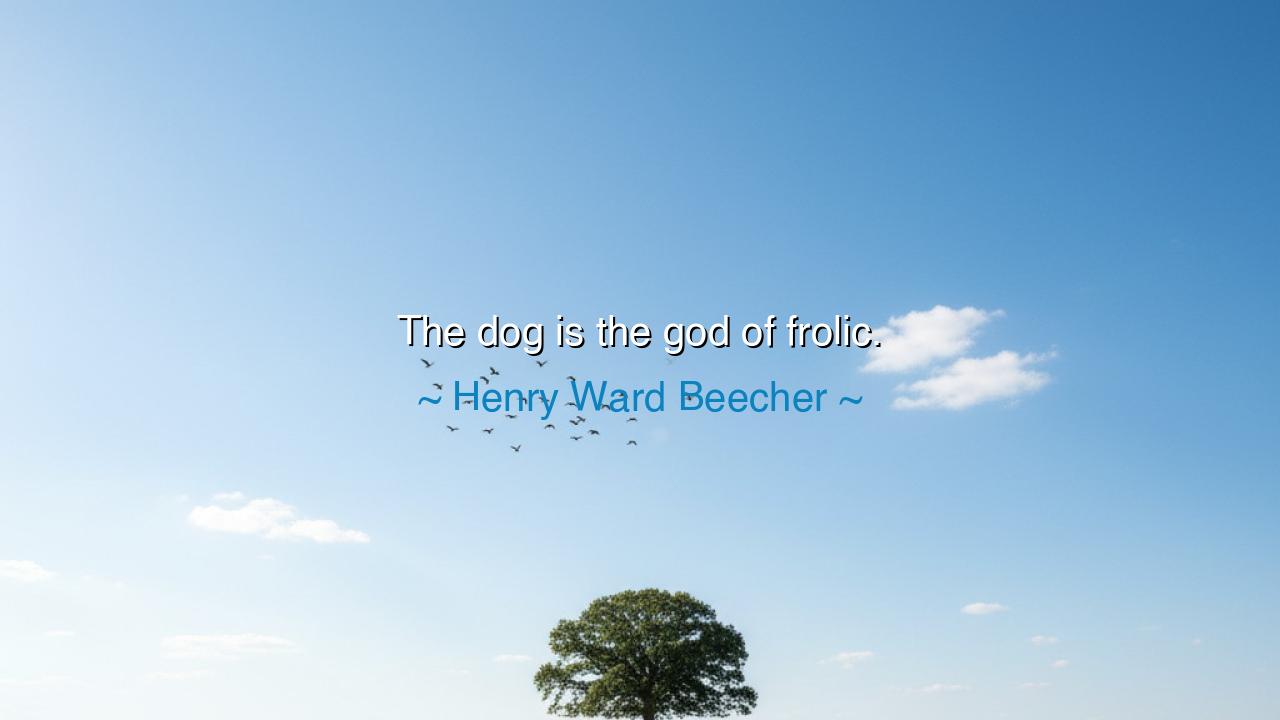
The dog is the god of frolic.






Henry Ward Beecher, preacher of fire and gentle humor, once proclaimed with radiant joy: “The dog is the god of frolic.” At first hearing, these words strike the ear with playfulness, yet behind them lies the strength of a profound truth. For Beecher, a man who understood both the burdens of life and the delights of the spirit, saw in the dog a living emblem of joy, freedom, and innocence. The animal, so bound to humanity by loyalty and love, embodied something divine: the sacred art of play.
The origin of this saying emerges from Beecher’s role as a minister and reformer in the 19th century, a man often surrounded by weighty struggles—slavery, injustice, sorrow. Yet even amidst heavy battles, he recognized the importance of lightness, of cheer, of delight. By calling the dog the god of frolic, he was not speaking irreverently of divinity, but elevating play to its rightful place as a sacred gift. To frolic is to remind the weary heart that life is not only duty and trial, but also laughter and dance.
Consider the dog in its natural state: bounding across fields, tail wagging, eyes gleaming with simple delight. It greets its master with unrestrained joy, finds pleasure in the smallest stick, and turns the mere act of running into a celebration of existence. In such frolic lies a kind of holiness, for it teaches the human heart what it often forgets—that joy is not found only in wealth or triumph, but in the pure experience of being alive. The dog becomes a silent prophet, preaching with wagging tail and playful bark the sacredness of joy.
History itself shows us that this truth is not small. Recall the soldiers of World War I, living in the filth of trenches, their spirits battered by fear and death. There, dogs served as messengers and companions. Yet beyond their usefulness, their playful nature brought life into the shadow of despair. A soldier, stroking a dog or watching it chase after a ball of rags, could feel the heaviness lift, if only for a moment. In those fleeting moments of frolic, hope survived. Indeed, the dog’s joy carried something divine—it saved men’s spirits when steel and fire sought to break them.
Beecher’s teaching also mirrors an older truth: in the ancient world, play was not scorned, but revered. The Greeks saw in the god Dionysus not mere chaos, but the liberation of the soul through joy. The Psalms themselves speak of creation leaping like lambs, rejoicing before the Lord. To call the dog the god of frolic is to join this lineage of wisdom: joy is not trivial, but sacred. The dog, in its unashamed celebration of life, stands as a symbol of what we must reclaim—a holiness of laughter, of play, of delight.
The lesson for us is luminous: we must not despise joy. Too often, men burden themselves with endless toil, believing seriousness to be the only measure of worth. But the dog teaches us that frolic is not weakness; it is strength of spirit. To laugh, to play, to rejoice—these are not escapes from life, but nourishment for it. Just as the dog runs to renew its vigor, so must we embrace joy to renew our hearts. Without frolic, duty becomes drudgery, and the soul withers. With it, even hardship can be endured.
Practically, this means seeking play in daily life. Walk in the fields, laugh with friends, play with your children, let your heart be lightened by the small delights around you. Do not wait for great feasts or grand victories to celebrate—rejoice in the ordinary, as the dog rejoices in a simple stick or the call of its master. In doing so, you will not only honor life, but also the divine wisdom hidden within it: that joy is sacred, and that to frolic is to live fully.
So let Beecher’s words echo across time: “The dog is the god of frolic.” Receive them not as jest alone, but as a commandment of joy. For the world is heavy, and burdens will always come. But in the wag of a tail, in the leap of a playful heart, lies a reminder from heaven itself: that laughter and frolic are not luxuries—they are the sacred breath of life.






AAdministratorAdministrator
Welcome, honored guests. Please leave a comment, we will respond soon